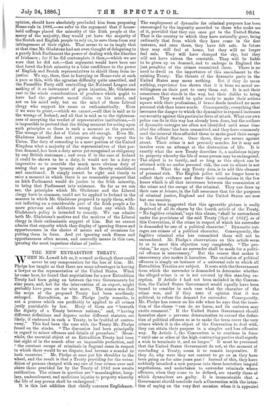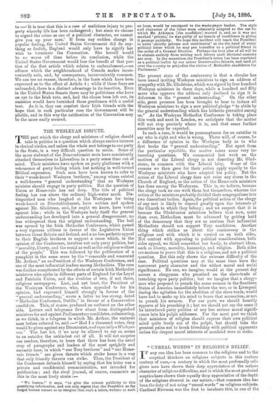THE NEW EXTRADITION TREATY.
WHEN Mr. Lowell left us, it seemed as though there could never be any compensation for the loss of him. • Mr. Phelps has taught us that there are some advantages in having a lawyer as the representative of the United States. When he came here, he found that negotiations for a new Extradition Treaty had been going on between the two Governments for nine years, and, but for the intervention of an expert, might probably have gone on for nine more. The reason was that the scope of the proposed Treaty had been needlessly enlarged. Extradition, as Mr. Phelps justly remarks, is not a process which can profitably be applied to all crimes justly punishable by law. Many of them are " beneath the dignity of a Treaty between nations," and, ." having different definitions and degrees under different statutes, are likely, if embraced in such a Treaty, to be fruitful of contro- versy." This had been the case with the Treaty Mr. Phelps found on the stocks. " The discussion had been principally in regard to minor offences and details of procedure." Mean- while, the essential object of an Extradition Treaty had been lost sight of in the search after an impossible perfection, and " the constant escape of criminals in flagrant cases in respect to which there would be no dispute, had become a scandal to both countries." Mr. Phelps at once put his shoulder to the wheel, and the result is that a Treaty providing for the extra- dition of persons charged with any one of four crimes over and abbve those provided for by the Treaty of 1842 now awaits ratification. The crimes in question are "manslaughter, burg- lary, embezzlement, and malicious injuries to property whereby the life of any person shall be endangered."
It is this last addition that chiefly concerns Englishmen.
The employment of dynamite for criminal purposes has been encouraged by the impunity accorded to those who make use of it, provided that they can once get to the United States. That is the country to which they have naturally gone, being ordinarily that from which they have come in the first instance, and once there, they have felt safe. In future they may still feel at home, but they will no longer feel safe. They will have changed the sky, but they will not have outrun the constable. They will be liable to be given up on demand, and to undergo in England the just penalties of the crimes committed there. There is no need to dwell on the importance of this amendment to the existing Treaty. The threats of the dynamite party in the United States may mean nothing. But if they do mean nothing, experience has shown that it is from no moral un- willingness on their part to carry them out. It is not their conscience that stands in the way, but their dislike to being banged. They would be quite ready to make their actions square with their professions, if brave deeds involved no more personal risk than brave words. Consequently, everything that increases the danger to which the dynamiter is exposed increases our security against this particular form of attack. What our own police can do in this way has already been done, but the authors of dynamite outrages are often not identified until some time after the offence has been committed, and they have commonly used the interval thus afforded them to make good their escape to the United States. Once there, they are secure against arrest. Their crime is not precisely murder, for it may not involve even an attempt at the destruction of life. It is exactly what the new Treaty describes it, a malicious injury to property whereby the life of some person may be endangered. The object is to terrify, and so long as this object can be attained with no undue personal risk, the cost to others is not counted. What the new Treaty does, is to add this element of personal risk. The English police will no longer have to collect their evidence and draw their conclusions in the few hours which is all that intervenes between the commission of the crime and the escape of the criminal. They can draw up their case at leisure, in the full assurance that for the purposes of criminal justice, England and the United States are now but one country.
It has been suggested that this agreeable picture is really deprived of all its charm by the fourth article of the Treaty. " No fugitive criminal," says this clause, "shall be surrendered under the provisions of the said Treaty [that of 1842], or of this Convention, if the crime in respect of which his surrender is demanded be one of a political character." Dynamite out- rages are crimes of a political character. Consequently, the fugitive criminal who has committed them will not be surrendered. Mr. Phelps's observations on this article seem to us to meet this objection very completely. " The pro- vision," he says," that no surrender shall be made for a politi- cal offence is unnecessary." But the reason that makes it unnecessary also makes it harmless. The exclusion of political offences is simply an instance of a universal rule to which all Extradition Treaties are subject. It rests with the Government from which the surrender is demanded to determine whether the alleged crime is or is not covered by this standing ex- ception. If Article 4 had not been included in the Conven- tion, the United States Government would equally have been bound to consider in each case what the character of the crime was, and if they were of opinion that it was political, to refuse the demand for surrender. Consequently, Mr. Phelps has reason on his side when he says that the inser- tion of the clause " can do no harm, and its omission may excite comment." If the United States Government should hereafter show a perverse determination to extend the defini- tion of political offences so as to make the term cover the very crimes which it is the object of the Convention to deal with, they can attain their purpose in a simpler and less offensive way. By Article 7, the Convention is to continue in force " until one or other of the high contracting parties shall signify a wish to terminate it, and no longer." It must be presumed that the United States Government do not, at the moment of concluding a Treaty, mean it to remain inoperative. If they do, why were they not content -to go on as they have been going on for nine years past ? Instead of this, they have suddenly breathed a new purpose into these heretofore languid negotiations, and undertaken to surrender criminals whose offences, when they come to be defined, are exactly those of which dynamiters are guilty. It is inconceivable that a Government should conclude such a Convention with the inten- tion of saying on the very first occasion when it is appealed
to It is true that this is a case of malicious injury to pro- perty whereby life has been endangered ; but since we choose to regard the crime as one of a political character, we cannot give you up your man.' If from any sudden change in popular feeling, the United States Government did do any- thing so foolish, England would only have to signify her wish to terminate the Convention. She herself would be no worse off than before its conclusion, while the United States Government would lose the benefit of that por- tion of the first article which relates to embezzlement,—an offence which the neighbourhood of Canada makes incon- veniently safe, and, by consequence, inconveniently common. We can see no reason, therefore, in the fears which have been expressed as to the effect of Article 4 ; while if these fears are unfounded, there is a distinct advantage in its insertion. Even in the United States Senate there may be politicians who have an eye to the Irish vote, and, had the clause been left out, its omission would have furnished these gentlemen with a useful text. As it is, they can comfort their Irish friends with the hope that in each particular case the Government will be pliable, and in this way the ratification of the Convention may be the more easily secured.



































 Previous page
Previous page